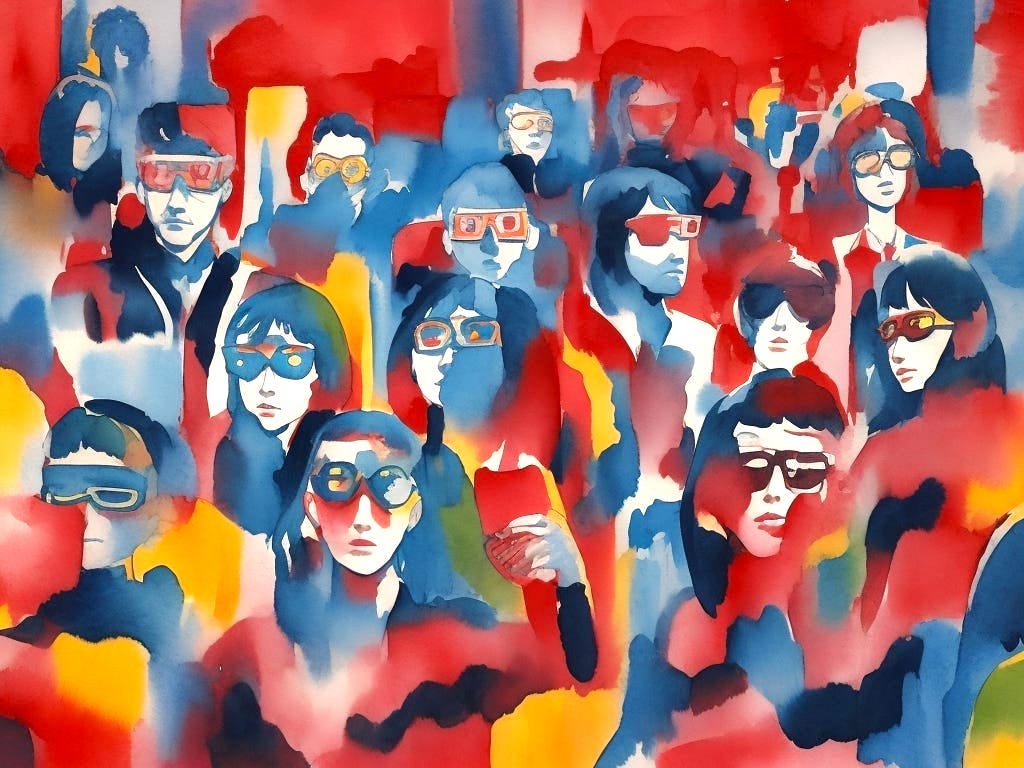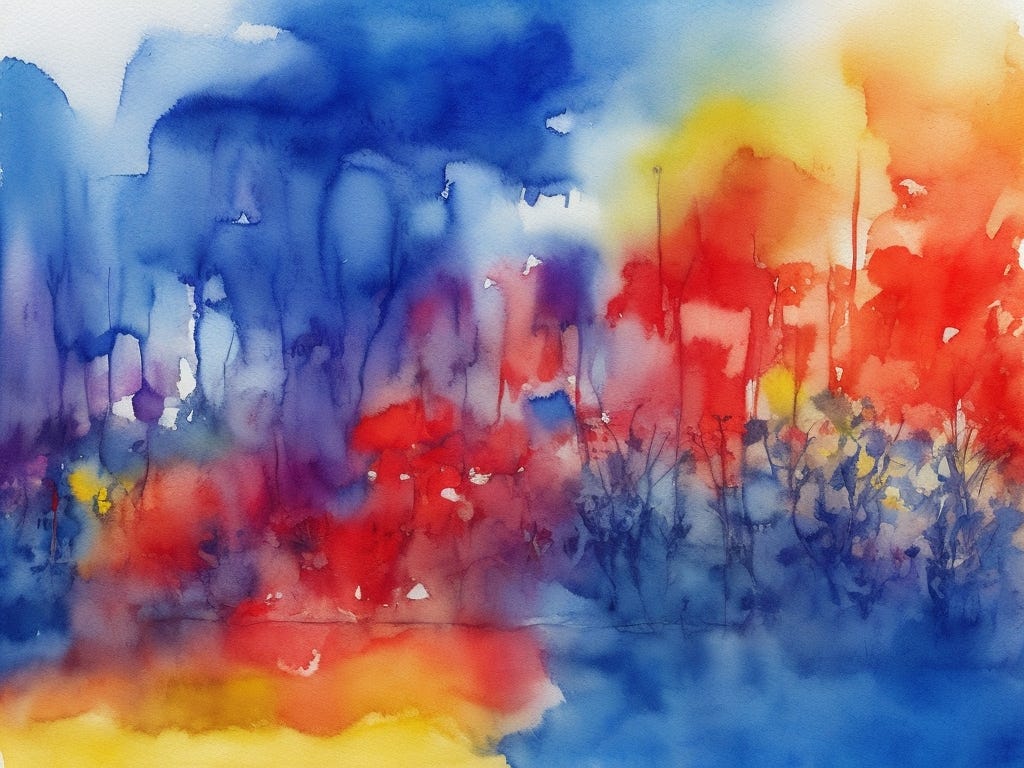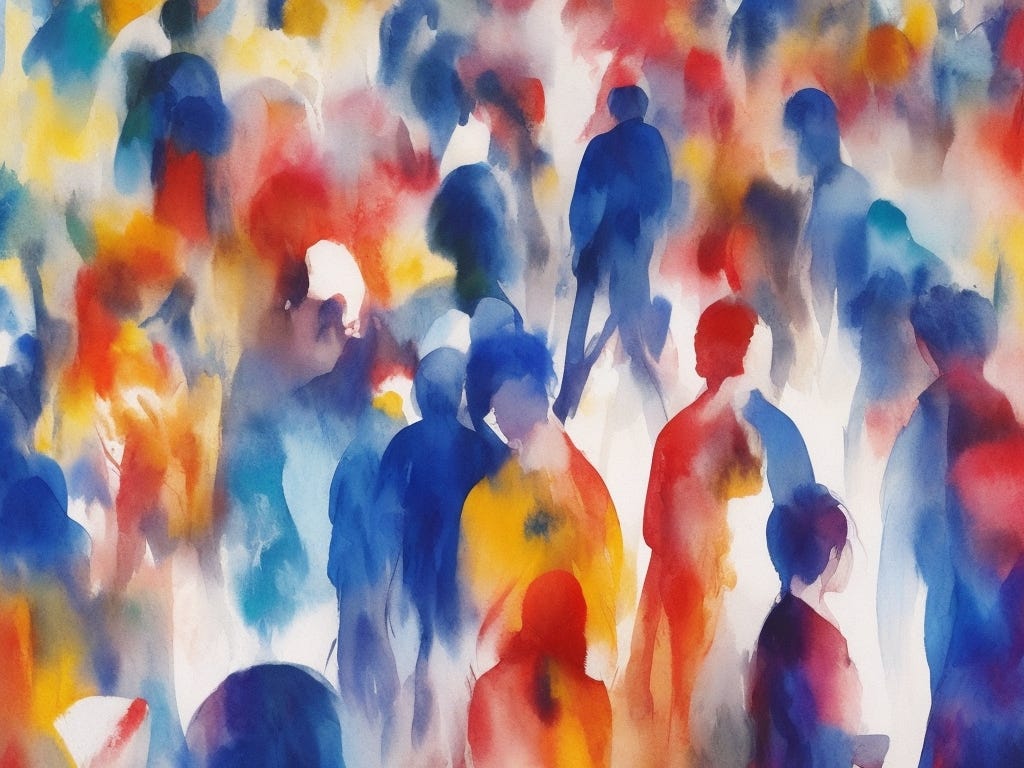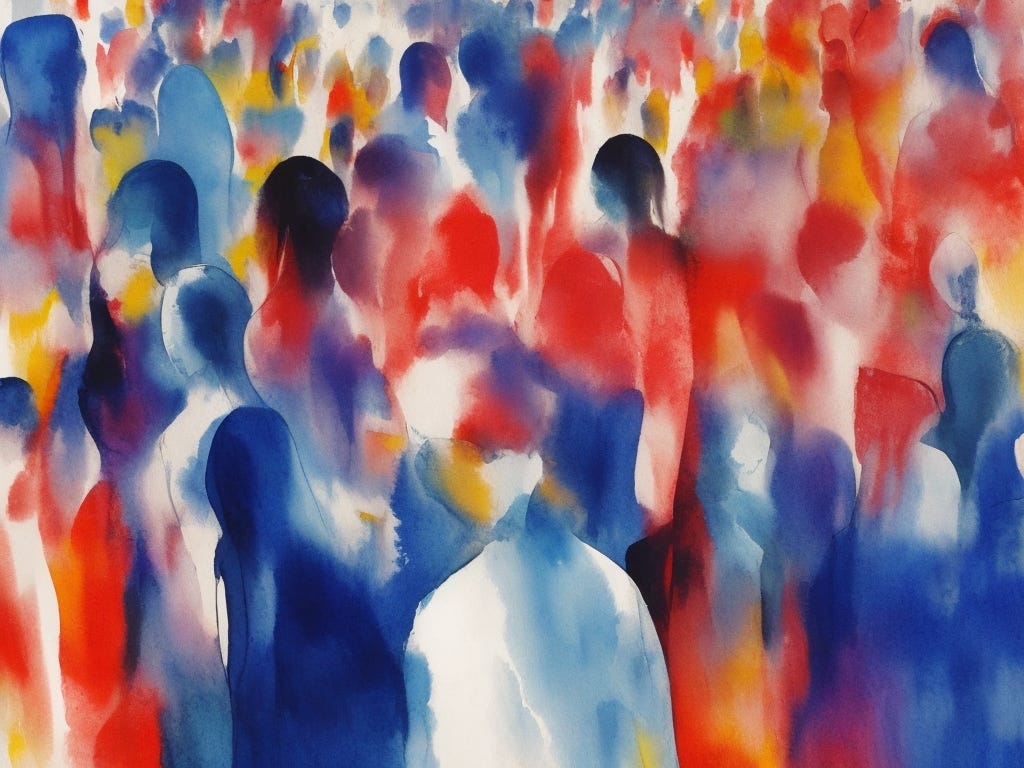“We die in proportion to the words which we fling around us… Those who speak have no secrets.”
— E. M. Cioran
Algorithmic allergy
A couple of nights ago, after a few glasses of wine, I deleted my Bluesky account. In the grand scheme of things this doesn't amount to much, and yet it felt like a personal milestone — one of those moments when you become fully aware that things have taken a qualitative leap.
I wasn’t interested in joining this platform to begin with, but then someone gave me an invitation code, pitching it as a great alternative to the sewage pit that is Twitter, and it felt silly not to give it a go for a month or so, because I’ve been trying to find ways to compensate for Twitter’s uselessness for a while. I didn’t use Bluesky very much, and just posted a couple of links to this newsletter, links that were duly ignored. Then I started to spot some of the same people I’d see on Twitter — some of the verbose and uninteresting maniacs of the cult known as #BookTwitter, that is. And then along came the same vacuous and monomaniacal conversations and apoliltical identitarian bullshit, posted for clout. And then I spotted the rather well-known Irish writer who once chastised me for posting a link to Bolaño’s short story tips— I was chastised because Bolaño, a man who died twenty years ago, and who would have turned seventy this year, didn’t read women, quelle surprise. And then someone used the term “skeet” to refer to posts and here I said, “with or without algorithm, this is shit — I’m off to pet my cats”. And that’s what I did, after I finished the bottle of wine.
I know I write about social media a lot in this newsletter, which might come across as excessive. It happens that social media is at the core of our culture, whether we like it or not. And I’d be dishonest if I didn’t say I became a writer thanks to social media and I’m still trying to figure out how to continue to write without it, because it’s clear to me that I can’t do social media any more1. By “I became a writer” I mean “I became a published writer”; and by “to continue to write” I mean "to continue to publish books”. This isn’t giving undue importance to social media but acknowledging the place we allowed this technology to occupy in our existence and our human and professional development.
When I opened my Twitter account back in 2010 or 20112 I didn’t know anyone in Anglo-American publishing, I knew very few writers in general, and I had no idea of how to make connections. Out of nowhere, just from talking to people online, I started to create my own milieus, and this networking (spiteful word) turned into writing opportunities. Then, in 2013, I launched an online magazine, Minor Literature[s], and the magazine wouldn't still be around3 if it weren’t for the networks we made online along the way. But at some point I started to feel uncomfortable by my social media interactions. And not last year, when Elon Musk arrived to give Twitter its coup de grâce. For me, it started a lot earlier — let’s say between 2016 and 2017.
Around this time I was doing research for what would become my novella Shitstorm (Open Pen, 2018). This research entailed that I spend a lot of time on Twitter, tracking pile-ons, trying to understand a whole new set of dramatis personae — such as MRAs, gamers, SJWs. I gained a good understanding of how our social media interactions work; and more importantly, I gained a good understanding of how mediated these interactions are. And let’s say that because of this understanding I became allergic to these interactions. I stopped talking publicly on Twitter, or I would delete my posts routinely, because “anything you say can and will be used against you in a court of law”, or at least in the court of social media, and if not ask Justine Sacco among many others.
It is only now, late September 2023, that I realise that my allergic satori coincides with the moment when Twitter introduced its algorithm. If before you’d only see posts in chronological order now there was an arbiter telling you what to see and when — a very intrusive intermediary that slowly became more and more nosey. Only now I realise that I was resisting becoming mediated.
It was the healthiest allergic reaction I’ve ever had, even if it took me years to act on it.
Walled gardens
After I took a step off the Twitter pedal, I still found this platform useful for a while. I’d tweet links to my work, my books, my newsletter, the magazine I was editing, and so on. It felt like I had found a workable balance between the need to be exposed to a ton of bullshit (as per the intro above) and finding this exposure justifiable — it was toxic but useful. This is no longer the case, and by design, not error.
Most social media platforms in 2023 are shielded from the outside world by a “walled garden”, to quote Cory Doctorow and this excellent article for Wired4. Although the piece’s title might suggest it’s just about TikTok, its main thesis applies widely. Doctorow argues that all social media platforms tend towards enshittification over time — enshittification being the process by which platforms that initially provided value to users transition to prioritising business customers first, to finally end up prioritising their own interests at the expense of both lay users and business customers. The ultimate effect of enshittification is the demise of the platform.
“Value” here is an interesting term, because it’s a very simple concept — “value” means that users get what they want to get from the time they invest on the platform. Regarding “value”, Doctorow explains how platforms like Facebook, Twitter, and now TikTok have evolved from letting users see what they want to see to forcing users to see what the platform thinks they want to see — via cunning algorithms. But then, this algorithmic influence isn’t neutral, since it can be tampered by paying to promote content. According to Doctorow TikTok takes this tampering further, by manually promoting content in order to lure media companies and influencers into the platform. The result is that users get less and less value from the platforms as the interference grows.
For this strategy to work — for users to be exposed to as much content as the platform wants them to be exposed to — they can’t leave and they need to play only within the confines of the “walled garden”. It is not surprising then that any content that contains a link — a safe conduct to the outside world — is punished by the Algorithmic God, whilst shitposting and intramuros verborrea are rewarded with visibility. In other words, the production of free content is welcomed, but a safe conduct is a challenge to the monopoly of attention that the platform exercises, and for that reason a punishable offence.
Twitter has now fully embraced this logic, taking it even further, to the point that Doctorow (like many others) has realised that he’s shouting into the void, lamenting (somehow pathetically) that:
“I have ~500k followers on Twitter and my threads used to routinely get hundreds of thousands or even millions of reads. Today, it's hundreds, perhaps thousands.”
Doctorow’s disappointment is the disappointment of someone who’s spent time building a presence on the platform only to find that this presence is now useless, that there’s no more value to be found. By his own admission he ended up coughing $8 for Twitter Blue — a ladder to climb the garden walls, if you want. This sounds like a workable solution, right? But who’s to say if the platform won’t take a different turn in its path towards enshittification and then the $8 ransom no longer mean anything? Or perhaps the matter isn’t if but when.
Since social media platforms (or at least the ones that have the volume of users) are profit-making ventures, enshittification is unavoidable, if the business is to remain profitable. This is the case even if the process end ups alienating whoever is still hanging out in the now drying garden. Is it self-destructive? Of course it is. But anyone familiar with the patterns of capitalist accumulation wouldn’t be surprised about this need to extract value as fast as possible, whatever the consequences — look at extractivism and the environment, for example.
Perhaps social media platforms’ biggest coup has been to convince us that “emotional capitalism” (Eva Illouz via Byung-Chul Han) isn’t really capitalism but a public service. The second greatest coup was to convince us that playing within the limited space of the walled garden was beneficial for us and the only way to play.
So, now that the walled gardens of social media are becoming more and more apparent and we fail to extract value from our investment of time: what keeps us from jumping over the fence?
I’s not socialisation / activism / communication — it’s very likely addiction
One of the most ridiculous statements I have read about social media use is that quitting is a form of privilege5. And that this is the case, because you can use Twitter et al to “speak truth to Power” (I’m quoting a real person here, a very popular user), that not seizing this opportunity is something only some can afford — the privileged ones. This is a common argument in some circles of the “identitarian left”, with cadres who more often than not limit all their activism to the social media realm — an activism that more often than not is just a form of careering, by the way.
Leaving aside the fact that 36.4 percent of the world population lives without internet access — and that it’d be incredibly dim to call them privileged for this — the above statement is comical because it backdates at least a decade. Yes, ten years ago it might have been possible to “speak truth to Power” on social media. The so-called Arab Spring wouldn’t have taken place without Twitter. The indignados in Madrid, the Argentine feminist movement, and so on, wouldn't have come together without Twitter. And I personally remember taking part in the student demos of 2011, and using hashtags to avoid being kettled by the police in Central London— I found Twitter very useful then, this unmediated Twitter of yesteryear. But these movements, on the other hand, came together in the meatspace and social media was just one of their means of communication. Twitter et al might have democratised our ability to participate in political discourse, and this might have given a political voice to many who otherwise wouldn’t have been able to participate for whatever the reason, but without boots on the ground, any movement is condemned to dissipate.
More urgently, since the introduction of an algorithm that manipulates our timeline (so that we see what social media platforms want us to see), it should be obvious that our conversations will be severely limited by that same Power some are under the illusion of speaking truth to. You can’t speak truth to Power in Power’s backyard and with Power’s megaphone — thinking so is politically naive to a laughable degree! Or perhaps it’s a form of nostalgia. Or perhaps it’s a form of addiction. The person I’m quoting above, this person who claims to be blessed by the gift of being o “speak truth to Power” on Twitter, has amassed over 750k tweets in over a decade. This is a person with other platforms, by the way, not a disenfranchised no one without a mouthpiece. It feels like such a waste of time, to dedicate so much attention to shouting into the void, when that time could have been dedicated to reaching people elsewhere.
But then, the algorithm is addictive. That’s not an accident — it’s its very raison d’être.
Becoming unmediated
I’m petting my cats again, out of nothing better to do. One of them, the male one, bites my hand, as cats — those furry bastards — do. Meanwhile autumn is setting in. It’s Sunday.
It feels lonely not sharing this moment with someone else. It feels strange not taking a photo of the lights in the flats at the back of my house. Every time I post one of these images on Twitter or Facebook or Instagram or Mastodon or Bluesky, or whatever, they get a lot of likes. The likes make my heart warm — those little dopamine shots. And now I’m resisting that — I’m resisting that warmth and I’m resisting the dopamine shots —those shots in my right temple — just because I’ve had enough. How long for, I don’t know.
I wonder what would an unmediated life look like. Is it even possible?
Perhaps becoming unmediated entails reconnecting with those moments of emptiness and loneliness. I feel there’s something about that. And I feel that this is the social media’s spectacle third greatest coup: to deny us of our emptiness, filling our minds with words and images instead.
I long for the choice to think nothing. I long for the choice to say nothing. Is that what privilege is all about? Then grant me that privilege and let me escape the walled garden.
In the interest of even more honesty: I still have an IG account that I use mainly to think visually (post pretty pictures) and see what my friends back home are doing. For some reason it doesn’t annoy me so much as other platforms, perhaps because being old and ugly (and OK with this) I’m not in any demographic likely to be too affected by its algorithmic mind fuckery. Most of what I’m offered by the platform are football videos and cat pictures. That said, I’m not sure how much more I’ll be able to withstand my friends’ duck-face selfies, so don’t waste your time following me there.
I can’t remember and I won’t reactivate my account just to verify this.
OK, it might be a form of privilege, to the extend that not being addicted to crack cocaine is a form of privilege.








Yesterday, I saw a post saying, "In a meeting today, so won't be here as much."
So fuckin what? I don't get it. Why do people need a public announcement they won't be so present on a social media platform for one day?
Social media, same as any popular movement, political, religious, social, etc. is subject to the sinister power that infiltrates and insinuates itself into everything. Conformity, control, judgement, etc. It morphs into anything. Conservative, Labour, fascist, Communist, socialism, Nazism, Democrats, Republicans, Christianity, Islam, Judaism, Hinduism, Buddhism, social media, everything. This dark entity will become whatever is popular, whatever is forced on us, chosen by us, voted in, enjoyed, hated, anything. It seeks to control.
I found this cold shower of an essay unpleasant and invigorating. Thanks for posting.